 Why are some people able to openly share their thoughts and ideas, without worrying about what others think? Why do others hide their opinions and views, to be shared only with those most closest to them? While civility and social contract theory may explain this phenomenon in part (no one wants to be a jerk, right?), an interesting construct may explain this more fully: The Willingness to Self-Censor. According to psychologist Andrew Hayes, some people are more willing to withhold their opinion from those they believe might disagree with that opinion. Rather than sharing their opinions freely, they wait until they are in a comfortable place to speak, where they are free from being critiqued. Or they simply do not reveal their true thoughts at all. This theory, I believe, has important implications for writers. Some of us (and I put myself in this category), might score high on the Willingness to Self-Censor Scale. While we may feel we are protecting ourselves, we should consider: 1. Not surprisingly, as Hayes explains, self-censors are more likely to be "more apprehensive about communication." Are we writing as well as we could be, if we are constantly censoring ourselves? Maybe we are limiting our voices by not digging deep enough, by not bringing every emotion and opinion to the page, by not freeing ourselves. Maybe the fear that people won't agree with us, or that they won't like what our characters do or say, keeps us from writing at all. 2. Self-censors also "fear negative evaluation to a greater extent" as compared to those less willing to self-censor. So not only does self-censorship negatively impact the ability to write honestly and deeply, but it also impairs the self-censor's ability to withstand critique. So perhaps, writing more honestly will help free us from our fear of other people's criticism. But what do you think? As a writer--are you writing as openly (less willing to self-censor) as you could be? As a reader--do you appreciate openness and rawness on the part of the writer?
4 Comments
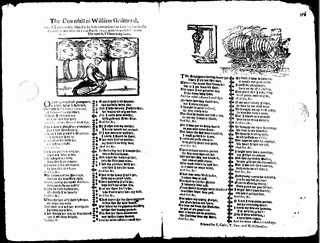 Wing / 2705:15 A recent post by author Eric Beetner on Holly West's blog has made me deeply reflect on the way I think about writing. Eric, a musician as well as a writer, was discussing the important role that music plays in his crime fiction. Eric uses music to add dimension to his characters, explaining "Music can be an effective way to get to know a character since music is very personal." We see this all the time in film, especially to set a mood, but I'm not sure how common this is in novels. But as I thought about it, I have used music to emphasize key themes in my writing, but in a very different kind of way from what Eric describes. The murders in my first novel, A Murder at Rosamund's Gate, are largely described through ballads, broadsides and other penny pieces... which is how 17th century Londoners would have learned about crimes within their community. Murder was literally described in verse, sung by booksellers on street corners, in a sort of a half fictional, half truthful way. Take, for example, this 1660s ballad which I chose at random from the Early English Books--a large collection of penny press from the 16th to the 19th centuries. As always, the title provides a synopsis to the reader (or listener, as neighbors and friends would read these ballads out loud): The downfall of William Grismond: or, A lamentable murder by him committed at Lainterdine in the county of Hereford, the 22 of March, 1650, with his woful [sic] lamentation. 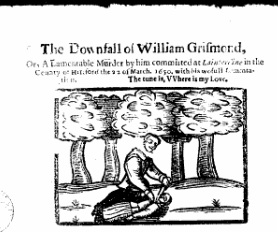 If you just look at the first part, you'll see the author specifies that the murder ballad should be sung to the tune of "Where is my love." (Ironic, of course, given that his love is lying on the ground, having been murdered at his hands. The audience would have gotten the joke). But the point is that the story wasn't meant to be just read, but sung according to a well known popular tune. Somewhere along the way we may have lost this connection between music and fiction-writing. Obviously, a lot of musicians are story-tellers, but I'm not sure how many novelists frame their stories musically.
So I'm curious...If you write, do you deliberately use music as a way to develop themes, characters, mood etc? If you are a reader, do you hear a soundtrack play as you read? Do you want to? 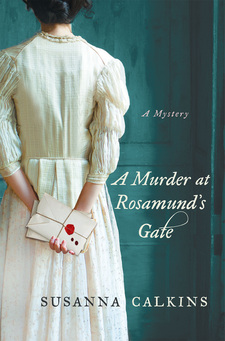 I'm so excited to announce... Fifteen copies of A Murder at Rosamund's Gate are being given away on Goodreads! Contest runs Nov. 20-Dec. 14, 2012. (All of a sudden I wish I had a really cool tagline like 'May the odds be ever in your favor.' But I don't, so good luck and thank you!) 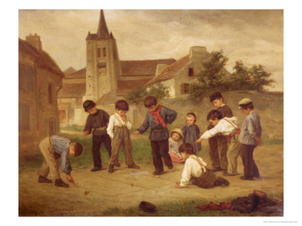 Watching my five-year old play hopscotch the other day got me wondering--where did this simple game come from anyway? I mean, if you think about it, doesn't HOP SCOTCH sound like it's connected to beer and liquor? Maybe the game came from kids watching adults stumbling out of taverns, under the influence, trying to hop on one foot while picking up stuff they'd dropped, without toppling over. Maybe kids mimicked the grown ups and over time--voila!-- the game of hopscotch emerged. (Okay, I'm writing this entry on a Friday night after a LONG week, so I could be reaching.) 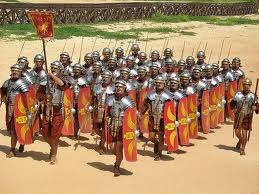 so these guys played hopscotch? Indeed, a quick internet search informed me that no, hopscotch has nothing to do with alcohol (darn it! I thought I was onto something there). Instead, a jillion sites claim that the game actually derived from an ancient Roman military training exercise. Roman soldiers, wearing full body armor, would hop through a hundred-yard field in a precise way, to help improve their footwork in battle. (Cool, hey? Shall I stop here?) Wel-l-l-l, I'm always a bit skeptical of what I read on the internet. Especially since many of these sites seemed to be just parroting the same tidbit over and over without any evidence. And there didn't seem to be any evidence of the term before the seventeenth century. And then I found this fascinating bit of detective work carried out by the "Rogue Classicist." Here, he essentially traced the origins of the hopscotch myth--and yes, it is a myth--to a misunderstanding. Apparently, in 1870 a scholar sharing his findings in an archeology journal made an offhand comment to the effect that some ancient tiles and disks might be 'admirably suited to our modern game of hopscotch.' But someone else misunderstood, and made an erroneous leap--reading a link from ancient times to modern game that was not there. This misunderstanding was picked up, and repeated so many times that eventually it became "fact". Oh, and what's the truth of it all? Hopscotch, originally called "scotch-hop", was a game which probably emerged in seventeenth-century England (although similar games can be found around the world.) First mentioned in the Book of Games in the 1670s, Francis Willughby describes the game of "hopscotchers" in which children play with a little piece of lead on a floor with lines etched--or "scotched"--onto its surface. So, a game. However, if you prefer, we can rewrite the history of hopscotch once again. Just cut and paste my imagined origins of the game--you know, where kids were laughing at drunk grown-ups--and pass it off as fact. What do you think? 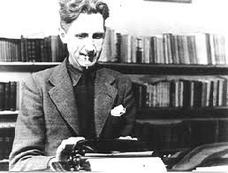 Two hands good, one typewriter bad In college, I took a really great class on George Orwell. While I enjoyed exploring his better known works (such as Animal Farm and 1984), I was fascinated by the essays that Orwell penned about different aspects of his life. In particular, Orwell's essay "Why I Write" resonated with me at a deep level. I read the piece again recently, and I'm still struck by his explanation of what motivated him as writer and--arguably--perhaps all writers. He says there are four main motives for writing:
These last two points do much to drive and inform my own historical novels. I don't believe in absolute truth, or in one set historical narrative. I do hope, however, to get readers to question their perceptions of society, culture, gender, power and privilege--to rethink what they think they know. While my agenda is wrapped up in what I hope is a compelling mystery, its certainly there. I'm curious though. Do you agree with Orwell? Are books by nature political, in the widest sense of the term? Harry Potter? Twilight? The Lord of the Rings? 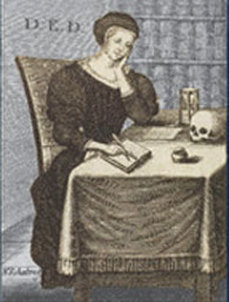 It's hard to believe that I've been blogging for an entire year now. I've really enjoyed sharing some of my thoughts on history, writing, reading, and my path to publication with you. I never know exactly what will resonate with readers of this blog, but I can tell you the most viewed, tweeted and shared posts have featured cuckolds, riddles, jests, guest interviews (Greg Bardsley, Danna of Cozy Mystery Blog), my life as a pirate, when mince pie was banned, and of course, the wisdom of my Alpha Reader. But I thought it would be fun to hear from you. So even if you've never left a comment, feel free to check a few boxes and tell me what you think! (This also lets me check out the survey feature...). Thanks! |
Susanna CalkinsHistorian. Mystery writer. Researcher. Teacher. Occasional blogger. Categories
All
Archives
May 2023
|
 RSS Feed
RSS Feed